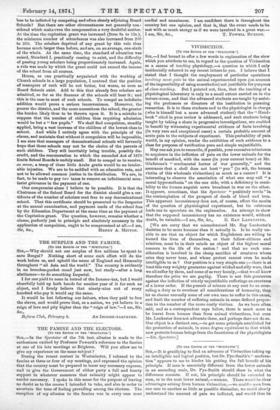VIVISECTION.
(TO TIIII EDITOR OF THE "SPECTATOR.") SIR, —I feel bound to offer a few words in explanation of the view which you attribute to me, in regard to the question of Vivisection as a means of teaching physiology,—a question to which I only incidentally referred in my recent letters to you. I believe that I stated that I thought the employment of particular operktions involving acute pain to the animal experimented upon (on account of the impossibility of using antesthetics) not justifiable for purposes of class-teaching. But I pointed out, then, that the teaching of a physiological laboratory is only to a small extent carried on in the lecture-room, and that the advanced students are taught by assist- ing the professors or directors of the institution in pursuing researches. It is to these students and to the physiologist in charge (who is himself but a more advanced student) that the " Hand- book " cited in your review is addressed, and such students being taught by taking a share in progressive investigations, are enabled to benefit by witnessing experimental evidence of facts involving (in very rare and exceptional cases) a certain probable amount of acute pain to the subjects of experiment. This probability of pain would, in my opinion, render the exhibition of such evidence to a class for purposes of verification pure and simple unjustifiable.
May one ask you to reconcile, if possible, your excessive reluctance to acquiesce in the infliction of pain on the lower animals for the benefit of mankind, with the sneer (in your current issue) at Mr. Gladstone's " sentimental horror of war generally," and the assurance that a shell does not hurt " you" (to wit, the human victim of this wholesale vivisection) as much as a cancer? It is interesting to observe the association of what one may call "a moral hyperassthesia " on the one side, with a deficiency in sensi- bility to the human anguish sown broadcast in war on the other. It appears, sometimes, that the Spectator 44 positively revels" in the contemplation of the prospect of deeds of blood and iron. This apparent inconsistency does not, of course, affect the merits of the question of physiological experiment, but its existence leads one to speculate on the explanation. An attempt to show that the supposed inconsistency has no existence would, without doubt, be valuable.—I am, Sir, &c., E. RAY LANK ESTER.
[We are sorry that we misunderstood Mr. Ray Lankester's doctrine to be more humane than it actually is. Is he really un- able to see that an object for which Englishmen are willing to hazard the lives of themselves, or their fellow-citizens and relatives, must be in their minds an object of the highest moral concern to the life of the nation ? and that no such con- sideration is involved in the cheap sacrifice of creatures whose cries they never hear, and whose protest cannot even be made intelligible to us ? Our position is a very simple one ;—there is at least this very weighty guarantee against wicked and silly wars, that we all suffer by them, and some of us very keenly,—that we all know therefore the price we are paying. There is not this guarantee against the infliction of utterly unjustifiable sufferings on creatures of a lower order. If the pursuit of science at any cost be so over- ruling a duty as to overbear all considerations of humanity, then let us choose annually some of our own race to suffer in this cause, and limit the number of suffering animals in some defined propor- tion to the number of the more costly victims. As we have often said, and as a correspondent says below, there is much more to be learnt from human than from animal vivisections, but even Mr. Lankester does not advocate these, and perhaps dare not do so. Our object is a distinct one,—to get some principle established for the protection of animals, in some degree equivalent to that which now protects human beings from the fanaticism of the physiologists —En. Spectator.]


































 Previous page
Previous page